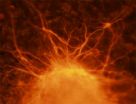(Press-News.org) UCPs or uncoupling proteins are present in mitochondria, the powerhouse of each cell in the body. The functions of most of the five known UCPs remain mysterious (UCP2-UCP5), whereby only the distinct function for UCP1 has thus far been discovered. UCP1 is responsible for heat production when muscle activity is deficient such as is the case with babies and animals in hibernation. The research team at the Department of Physiology and Biophysics at the University of Veterinary Medicine in Vienna were able to provide a fundamental explanatory concept for the function of UCP2 and UPC4 for the first time. Each of these proteins are involved in different types of cell metabolism.
UCP2 in Stem Cells and Cancer Cells
In earlier studies of immune cells, lead author, Anne Rupprecht, had already shown that UCP2 could be involved in increased metabolism. Embryonic stem cells precisely exhibit such an increased metabolism, as they rapidly and continually divide, just like cancer cells. Rupprecht searched for various UCPs in embryonic stem cells of mice and in effect found UCP2. "Very high amounts of UCP2 even indicated an especially strong increase in metabolism. In other studies UCP2 had also already been detected in cancer cells", according to Rupprecht.
UCP4 in Nerve Cells
In contrast to UCP2, UCP4 is only found in nerve cells. Nerve cells have a completely different metabolism. They seldom divide, unlike stem cells and cancer cells. The research team of Prof. Elena Pohl therefore examined embryonic stem cells that differentiated to nerve cells in culture. On the basis of this model system, the researchers could show that UCP2 is still existent in the quickly reproducing stem cells, yet at the moment of differentiation are replaced by UPC4.
"In our work, we have examined the natural process of cell differentiation from stem cells to neurons. We know that metabolism changes during differentiation. The fact that we found UCP2 in one case and in the other UCP4 proves for the first time that these proteins are associated with varying types of cell metabolism", specified Elena Pohl.
The researchers, for example, found only UCP2 in neuroblastoma cells - nerve cells that have malignant changes. UCP4, the usual protein of nerve cells was not detectable. UPC4 apparently got lost in the changed nerve cells that were on their way to becoming rapidly reproductive cancer cells.
UCPs for early detection of disease
Rupprecht describes the relevance of her work like this: "The composition of UCPs in the cells discloses information about their current condition. UCP2 could therefore give an indication at an early stage, if a cell is on the way to becoming a cancer cell. Even a classification of the tumor's malignancy would eventually be possible. A faulty mechanism in the nerve cells could lead to a functional disorder and, for instance, to a neurodegenerative illness like Parkison's disease."
INFORMATION:
The paper titled "Uncoupling Protein 2 and 4 Expression Pattern during Stem Cell Differentiation Provides New Insight into their Putative Function" by Anne Rupprecht, Dana Sittner, Alina Smorodchenko, Karoline Hilse, Justus Goyn, Rudolph Moldzio, Andrea E. M. Seiler, Anja U. Bräuer und Elena Pohl, was published in the PLOS ONE journal. DOI: 10.1371/journal.pone.0088474
http://www.plosone.org/article/info%3Adoi%2F10.1371%2Fjournal.pone.0088474
About the University of Veterinary Medicine, Vienna
The University of Veterinary Medicine, Vienna is the only academic and research institution in Austria that focuses on the veterinary sciences. About 1,200 employees and 2,300 students work on the campus in the north of Vienna which also houses five university clinics and various research sites. Outside of Vienna the university operates Teaching and Research Farms. http://www.vetmeduni.ac.at
Scientific Contact:
Prof. Elena Pohl
Unit of Physiology and Biophysics
University of Veterinary Medicine Vienna (Vetmeduni Vienna)
T +43 1 25077-4570
elena.pohl@vetmeduni.ac.at
Released by:
Susanna Kautschitsch
Science Communication / Public Relations
University of Veterinary Medicine Vienna (Vetmeduni Vienna)
T +43 1 25077-1153
susanna.kautschitsch@vetmeduni.ac.at
Hot on the trail of cellular metabolism
Researchers unravel the function of cell proteins
2014-03-05
ELSE PRESS RELEASES FROM THIS DATE:
Study shows nearly fivefold increased risk for heart attack after angry outburst
2014-03-05
BOSTON – Call it what you will – getting red in the face, hot under the collar, losing your cool, blowing your top – we all experience anger. And while we know that anger is a normal, sometimes even beneficial emotion, we're also aware of the often harmful connection between anger and health. New research from Beth Israel Deaconess Medical shows an even more compelling reason to think about getting anger in check – a nearly fivefold increase in risk for heart attack in the two hours following outbursts of anger.
"There has been a lot of research on anger; we already ...
Not even freezing cold stops alien species in high altitudes
2014-03-05
They hitchhike with us under the soles of our shoes and muddy car tires. Harsh and cold climates do not seem to stop alien plants from establishing themselves in high altitudes, where they now successfully penetrate the alpine vegetation, according to a study at Umeå University in Sweden and the University of Antwerp, Netherlands.
"Alien plants often gain advantages in their new environment because they lack natural enemies, and in this case the lack of strong competitors amongst alpine plants may be the key to success for generalist native species," says ecologist Ann ...
Horses set to gain health benefits from stem cell advance
2014-03-05
Horses suffering from neurological conditions similar to those that affect humans could be helped by a breakthrough from stem cell scientists.
Researchers who are the first to create working nerve cells from horse stem cells say the advance may pave the way for cell therapies that target conditions similar to motor neurone disease.
The research could also benefit horses affected by grass sickness, a neurological condition that affects around 600 horses a year in the UK.
Little is known about the disease, which causes nerve damage throughout the body. It is untreatable ...
Women's jobs are poorer paid, less flexible and more stressful
2014-03-05
Women's jobs are poorer paid, less flexible, more stressful, and offer fewer promotion opportunities than men's, a large international study has found.
Researchers say that the results disprove the theory that women have voluntarily traded less high-powered jobs in order to have more flexibility for their responsibilities at home.
Professor Haya Stier, of Tel Aviv University, and Professor Meir Yaish, University of Haifa, analysed survey data on the working lives of 8,500 men and 9,000 women in 27 industrialised countries, including the UK.
In a paper published ...
New: An environmentally friendly chemical reaction that does not waste any atoms
2014-03-05
This news release is available in German.
In the Research Group of Nuno Maulide, a chemist working at the University of Vienna, a new chemical synthesis for α-arylated Carbonyl derivatives was developed. Members of this class of substances typically possess interesting biological and pharmacological properties and often find applications as medicines. The new technique developed by the Maulide group, which allows such Carbonyl derivatives to be generated easily, efficiently and in an environmentally friendly manner – without wasting any atoms –, has raised ...
Suicidal ideation among US soldiers begins before enlistment
2014-03-05
Nearly 60% of soldier suicide attempts can be traced to pre-enlistment mental disorders, which are much more common among nondeployed U.S. Army soldiers than demographically similar populations of civilians (25.1% vs. 11.6%), according to a major new study. The vast majority (76.6%) of soldiers with mental disorders say their conditions started before enlistment, researchers found.
These are among the initial results published online today in JAMA Psychiatry based on a survey carried out as part of the Army Study to Assess Risk and Resilience in Servicemembers (Army STARRS), ...
Plant extract offers hope for infant motor neuron therapy
2014-03-05
A chemical found in plants could reduce the symptoms of a rare muscle disease that leaves children with little or no control of their movements.
Scientists have found that a plant pigment called quercetin – found in some fruits, vegetables, herbs and grains – could help to prevent the damage to nerves associated with the childhood form of motor neuron disease.
Their findings could pave the way for new treatments for spinal muscular atrophy (SMA) – also known as floppy baby syndrome – which is a leading genetic cause of death in children.
The team has found that the ...
Study comparing injectable contraceptives DMPA and NET-EN finds HIV risk higher with DMPA
2014-03-04
BOSTON, March 4, 2014 – Women who used an injectable contraceptive called DMPA were more likely to acquire HIV than women using a similar product called NET-EN, according to a secondary analysis of data from a large HIV prevention trial called VOICE, researchers from the National Institutes of Health-funded Microbicide Trials Network (MTN) reported today at the 21st Conference on Retroviruses and Opportunistic Infections (CROI) in Boston.
An unexpected finding in the study was that the combination of being positive for herpes simplex virus type 2 (HSV-2) and using DMPA ...
Raising an army of armchair activists?
2014-03-04
Social media may fuel unprecedented civic engagement. Digital networks might make possible mass protest and revolution – think "Arab Spring." But sometimes and maybe even most of the time, a new study suggests, the accomplishments of online activism are much more modest.
Published in Sociological Science, the paper was co-authored by Kevin Lewis, of the University of California, San Diego's department of sociology, with Kurt Gray, department of psychology at the University of North Carolina, Chapel Hill, and Jens Meierhenrich, department of international relations, London ...
Satellite video captures the eastern US winter storm track
2014-03-04
VIDEO:
This animation of NOAA's GOES satellite data shows the progression of the major winter storm over the US Mid-Atlantic and southern states on Mar. 2 and 3.
Click here for more information.
As NOAA's GOES-East satellite sat in a fixed orbit in space it monitored and provided visible and infrared imagery of the major winter storm that hit the U.S. east coast on March 2 and 3. Now, that data has been compiled and made into a video at NASA.
On March 2 and 3, a major winter ...
LAST 30 PRESS RELEASES:
Scientists develop new gut health measure that tracks disease
Rice gene discovery could cut fertiliser use while protecting yields
Jumping ‘DNA parasites’ linked to early stages of tumour formation
Ultra-sensitive CAR T cells provide potential strategy to treat solid tumors
Early Neanderthal-Human interbreeding was strongly sex biased
North American bird declines are widespread and accelerating in agricultural hotspots
Researchers recommend strategies for improved genetic privacy legislation
How birds achieve sweet success
More sensitive cell therapy may be a HIT against solid cancers
Scientists map how aging reshapes cells across the entire mammalian body
Hotspots of accelerated bird decline linked to agricultural activity
How ancient attraction shaped the human genome
NJIT faculty named Senior Members of the National Academy of Inventors
App aids substance use recovery in vulnerable populations
College students nationwide received lifesaving education on sudden cardiac death
Oak Ridge National Laboratory launches the Next-Generation Data Centers Institute
Improved short-term sea level change predictions with better AI training
UAlbany researchers develop new laser technique to test mRNA-based therapeutics
New water-treatment system removes nitrogen, phosphorus from farm tile drainage
Major Canadian study finds strong link between cannabis, anxiety and depression
New discovery of younger Ediacaran biota
Lymphovenous bypass: Potential surgical treatment for Alzheimer's disease?
When safety starts with a text message
CSIC develops an antibody that protects immune system cells in vitro from a dangerous hospital-acquired bacterium
New study challenges assumptions behind Africa’s Green Revolution efforts and calls for farmer-centered development models
Immune cells link lactation to long-lasting health
Evolution: Ancient mosquitoes developed a taste for early hominins
Pickleball players’ reported use of protective eyewear
Changes in organ donation after circulatory death in the US
Fertility preservation in people with cancer
[Press-News.org] Hot on the trail of cellular metabolismResearchers unravel the function of cell proteins



